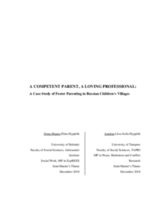Abstract
The 2010s have witnessed increasing political and public concern over child and family-related issues in Russia, with child welfare and family policy being elevated to the top of the state’s political agenda. The Russian conservative government has prioritised the protection of traditional family values and family as the mainstay of Russian society and thereupon introduced major policy and welfare reform programmes, one of which works towards deinstitutionalising the country’s entire child welfare system. Building upon the idea of every child’s right to a family, this child welfare reform aims at dismantling the existing system of institutional care for children, replacing placements in institutions with community and home-based, family-like forms of alternative care, including foster care. Service provider responsibilities are hence, being transferred from the state to private and third sector stakeholders operating in the field of child and family welfare. Among these agents providing alternative care are the so-called Children’s Villages. These Villages, as the name suggests, are largely NGO-run communities of foster families, caring for children left without parental care in a non-institutional setting.
This thesis takes a range of Russian Children’s Villages as its case study in an attempt to investigate foster parents’ perceptions of parenting and thus shed light on the present-day development of the alternative care system in Russia. The aim is to bridge together bottom-up narratives and top-down political ideology via qualitative analysis of micro-level constructions of parenthood and government-promoted ideas on family. The ongoing process of deinstitutionalisation of child welfare in Russia provides the larger political context for our inquiry that fosters a social constructionist approach and, through thematic content analysis, seeks to answer the following research questions: How do foster parents perceive parenthood/parenting in the context of Russian Children’s Villages? How do their perceptions intersect with government-promoted ideas on family? The primary data consist of focus group and expert interviews with foster parents and child welfare professionals conducted on site in six Children’s Villages in Russia in 2017. The altogether nine interviews, with a total of 58 respondents have been conducted by two other researchers in the ‘A Child’s Right to a Family: Deinstitutionalisation of Child Welfare in Putin’s Russia’ research project that our thesis is also part of.
Our findings suggest that parenting takes multiple, concurrent and reciprocal forms, whereby it is largely a cyclical process and a jointly constructed and negotiated experience in the social context of the Children’s Villages. The Villages and the individuals therein are not merely care deliverers assuming service provision responsibilities from the public sector, but they carry considerable innovate potential and valuable ideas on family and parenting vis-à-vis the desired development of systems of alternative care in today’s Russia. Yet, the political arena in Russia remains ambivalent, enabling and coercive at the same time, introducing policies that are often either contradictory or incompatible. Alongside ambitious liberal tendencies and reformist programmes we may observe illiberal and restrictive political and legislative processes that undermine the sustainable fruition of the more progressive reforms amid structures that hold onto authoritarian traditions. While the traditional value base of the conservative government fails to fully embrace the plurality of family systems in modern Russia, the family structures in the Children’s Villages demonstrate that family diversity is very much a contemporary reality in Russian society – and foster families one of its emerging forms.

